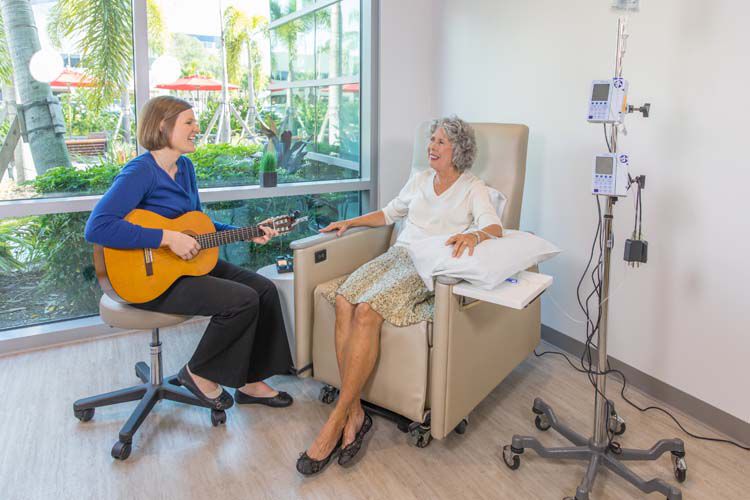
When Moreen Burkart walks through the doors of the Scully-Welsh Cancer Center once each month, she brings with her what might well be the most low-tech piece of equipment in the entire building: a Yamaha six-string guitar.
Made of humble spruce and nata wood, it has no LED readouts and no computer chips but, according to Burkart, “It opens up so many doors for discussions of life … emotional expression … and processing what [cancer patients] are going through.”
Indeed, the MD Anderson Cancer Center says, “when used in conjunction with conventional cancer treatments, music therapy has been found to help reduce pain and discomfort; improve mood and diminish stress; increase quality of life and allow patients to better communicate their fears, sadness or other feelings.”
Burkart is a certified music therapist who works for Vero Beach’s Visiting Nurse Association.
Just what is a “certified music therapist” and what (aside from musical instruments) do they bring to fight against cancer?
Burkart first cites science.
“There’s the psychology of understanding people,” she says, “then there’s the anatomy, the physiology; there’s knowing how music affects the body and the brain. And then there are the music foundations; you have to be able to pass proficiency in voice, guitar, piano and percussion.
“I have certification in neurologic music therapy, which is based on how music affects the brain. They have done a ton of research on it – MRIs and CAT scans. They’ve proven that music activates more areas of the brain than any other activity we do. Because of that, it actually is a really powerful tool.”
The University of Michigan’s Comprehensive Cancer Center agrees and adds that aside from having at least a Bachelor of Science degree, “board certified music therapists also train for 1,200 hours with patients and health care professionals. Using the combination of musical talent and education, they enhance cancer treatment to help meet the physical, emotional, cognitive and social needs of an individual.”
Many of the nation’s most highly regarded cancer centers, including Memorial Sloan Kettering and Baltimore’s famed Johns Hopkins, have instituted their own music therapy programs, and to Scully-Welsh’s volunteer coordinator Scott Duncan, music therapy sounded like just what the doctor ordered for Vero.
Duncan got in touch with Burkart and the VNA and told them, “We really would love to have music therapy here.”
Funding was a challenge, but with the aid of a $100,000 grant from Impact 100 and the cooperation of VNA, Burkart’s once-a-month visits to Scully-Welsh soon became a staple of the center’s palliative approach to treating and healing cancer patients.
Garage bands everywhere might be jealous of Burkart’s booking schedule. She and fellow VNA music therapist Mabel Ortiz are in high demand here in Indian River County.
Besides providing therapy at Scully-Welsh, they also work with hospice, Parkinson’s and dementia patients, and the demand for Burkart and Ortiz’s skills continues to grow. In fact, VNA is currently bringing in at least one new intern to help share the load.
Most of Burkart’s work at the Vero cancer center, she says, is done in the infusion center and the fifth-floor cancer in-patient unit. Because of the schedules in those places, she has to work fast.
“In hospice,” Burkart explains, “you get more time to build a relationship and a rapport.” But even her once-a-month visits to Scully-Welsh are rewarding because “when [cancer patients] allow me to work with them, they realize quickly how much more [music therapy] is then just, ‘Oh, sing a song for me and entertain me.’
“Music brings out emotions in us and allows us to express ourselves more easily.”
For more information contact the Scully-Welsh Cancer Center at 772-563-4673 or the Visiting Nurse Association at 772-778-0159.



